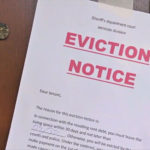A reference of North Carolina Eviction Laws, and steps of the North Carolina eviction process for landlords and renters, updated 2021.
- What are the reasons that landlords can evict tenants under North Carolina eviction laws?
- Nonpayment of rent (N.C. Gen. Stat. §42-3)
- Substantial damage to property (N.C. Gen. Stat. §42-12)
- Illegal activity (N.C. Gen. Stat. §42-46(a)(2))
- Non-compliance with the lease agreement (N.C. Gen. Stat. §42-27).
- Tenant remains in possession of the dwelling unit after the occupancy period without the landlord’s permission (N.C. Gen. Stat. §42-14).
- What notice do North Carolina eviction laws require that landlords provide tenants before starting the eviction process?
- For evictions based on non-payment of rent, the landlord must provide a 10-day notice. (N.C. Gen. Stat. §42-3).
- For evictions based on substantial damage to property, the landlord must provide a 10-day notice. (N.C. Gen. Stat. §42-12).
- For evictions based on illegal activity, no notice is required. (N.C. Gen. Stat. §42-46(a)(2)).
- For evictions based on non-compliance with the lease, no notice is required. (N.C. Gen. Stat. §42-27).
- The landlord can end a month-to-month tenancy by providing a 7-day notice. (N.Y. Real Prop. Acts. Law §232A).
- Do North Carolina eviction laws allow landlords to use “self-help eviction” methods, such as locking a tenant out of the rental unit or shutting off the utilities?
- No. North Carolina law prohibits self-help measures and allows tenants to recover any actual damages they suffer due to such actions. (N.C. Gen. Stat. §42-14).
- No. North Carolina law prohibits self-help measures and allows tenants to recover any actual damages they suffer due to such actions. (N.C. Gen. Stat. §42-14).
North Carolina Eviction Process: Step-by-Step
The eviction process in North Carolina involves the following steps:
- The landlord serves the eviction notice. The landlord must serve the appropriate type of eviction notice on the tenant if notice is required under the law. The notice must state why the tenant is being evicted.
- The landlord files an eviction lawsuit. The landlord can initiate the eviction process in North Carolina by filing a Complaint in Summary Ejectment and a Motion to Enforce Conditional Eviction Order Notice of Hearing, which schedules a hearing to determine if the tenant should be removed from the rental property.
- The landlord serves the legal documents. The landlord must legally serve the tenant with the legal documents.
- Parties attend the court hearing. The parties attend the hearing and present their case. If the tenant does not appear or the court rules in the landlord’s favor, the court provides a Judgment for Possession.
- The landlord requests a writ of possession. If the tenant refuses to move out after the ruling is made against them, the landlord requests a writ of possession.
- The landlord provides the writ of possession to the sheriff. The sheriff uses the writ of possession to forcibly remove the tenant from the property.







